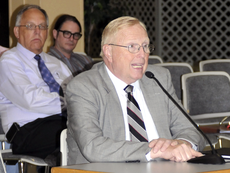University president Stephen Hulbert proposes a “Call to Action” as Nicholls looks at a possible 35 percent budget cut and the loss of stimulus funding for the 2011-2012 school year. Hulbert, special assistant to the president Larry Howell and vice president for academic affairs Laynie Barrilleaux participated in a state mandated exercise on what the University would do in the event of a 35 percent budget cut.
“An additional 35 percent cut will devastate this institution and cause irreversible harm,” Howell said.
The University administration was given two days to complete the exercise, which Howell hoped would make an impact on legislators. Howell said, however, that he does not think it did.
Last Thursday, Hulbert, Howell and Barrilleaux presented the information to the Faculty Senate.
“My first thought was ‘you have got to be kidding me,'” Todd Keller, Faculty Senate president, said. “What followed after was, ‘this cannot happen,’ and ‘we cannot allow this to happen.'”
There is a projected loss of $7.9 million from the 2010-2011 budget if Nicholls faces a 35 percent budget cut and the loss of stimulus funding. This loss would be on top of the $10.6 million or 29.4% reduction that Nicholls has faced since July 2008.
This would result in a reduction in academic programs and student services.
Howell said that if Nicholls faces these budget cuts, the choice of which programs to eliminate will depend on “enrollment, in terms of the revenue generated by the program and students, graduation rates and the necessity of the major to the region.”
The University has made no definite decisions yet.
“We have no formal planning document in place,” Hulbert said.
Howell said that Nicholls could potentially cut 18 majors, leaving nine degree programs if Nicholls has to face the worst case scenario.
“I don’t know if we could hide the data much longer,” Hulbert said.
Howell said that any degree program that graduates less than 30 students a year is at risk.
The programs at Nicholls, with the exception of general studies, that have over 30 graduates per year are nursing (147), accounting (48), culinary (38), education (114), biology (43), management (41), business administration (52), marketing (40) and applied sciences (52), which covers geomatics, petroleum services and safety and technology.
“The bigger programs might potentially be what we end up with, but it might not happen,” Howell said. “The whole idea is to get people to fight.”
This cut would affect about 2,000 students, Howell said.
General studies is the biggest completion program. About 521 of the 2,000 students that would be affected by the budget cuts would be general studies majors if the worst-case scenario occurs.
While Howell does not know what will happen to the students affected, he knows Nicholls will try to work with students to see how close they are to finishing. Some students may have to try to transfer to another university without losing too many credit hours.
“We cannot give years for students to finish, because it would be an immediate cut,” Howell said.
Hulbert’s biggest concern is that students think they can just go to another school and be safe. It is not just Nicholls going through budget cuts, but every Louisiana public university. If Nicholls cuts a certain program, it does not mean that another school might have it.
“We hope our students fight rather than flight,” Howell said. “If everyone pulls together and fights, we will get through this.”
The closest university to Nicholls is the University of New Orleans, which is 62 miles or 81 minutes away, followed by Louisiana State University (Baton Rouge), which is 68 miles or 85 minutes away.
The closest school most like Nicholls in size and scope is Southeastern Louisiana University, which is 80 miles or 102 minutes from Thibodaux.
Potentially hundreds of faculty and staff members would also be affected.
Howell said that the faculty situation is different because even though a program may be cut, not all of the faculty would be cut. Howell said some faculty members would remain for general education purposes.
Further reductions in staff and services could be made in student support, research support, technology support, student retention and progression support, athletics and general operational functions.
In response, the University is looking at possible solutions to help generate revenue.
One opportunity would be to eliminate the cap on tuition, which would cause students to pay for any hours scheduled above 12. Right now, if a student wants to take more than 12 hours a semester, that student is essentially getting those hours for free. If Nicholls eliminated the cap, it could generate an additional $4.1 million. The total budget impact from the loss of stimulus funds would be $2.8 million.
Another option Nicholls is looking at is differential tuition. This would allow Nicholls to charge a higher tuition to those students majoring in high cost programs such as geomatics, culinary arts and nursing.
Nicholls receives money from the state for each student who attends, but Nicholls’ state funding per 2009-2010 full-time student is less than average compared to schools similar to Nicholls such as Southeastern, Northwestern and McNeese.
Nicholls receives about $1,275 less than average. If Nicholls was funded as an average university, it would make a difference of about $3.63 million per year.
When legislators told Hulbert, Howell and Barrilleaux that Nicholls was not going to be given special treatment, Barrilleaux stressed that Nicholls did not want special treatment but to be treated as average.
Howell said that Nicholls “makes good business sense, serves a unique population and region and has a huge impact on the economy of south Louisiana.”
Hulbert said that higher education should not be reduced “until all other state agencies have been reduced by the same percentage.”
Hulbert’s “Call to Action” says that faculty, staff, students and the community need to voice the concern of higher education and Nicholls to all state leaders.
“If we remain quiet, it could allow changes to occur which could be detrimental to higher education in Louisiana,” Keller said.
Howell said that “if we do not see leadership from the various groups that control higher education in this state, we will never be able to recover from this destruction of one of the most critical elements of economic development in this state.”
Despite all of the information presented by administration, Howell said he does not think the cuts will be as dramatic as what the planning exercise called for.
Howell and Hulbert want to stress that students, faculty and staff should not panic. Instead, stand up for Nicholls and talk to legislators and Governor Bobby Jindal about why higher education should not be cut. Howell believes students should stand up and fight for their University.
“This is an issue where we have to stand our ground and fight for students to have public education,” Hulbert said.








